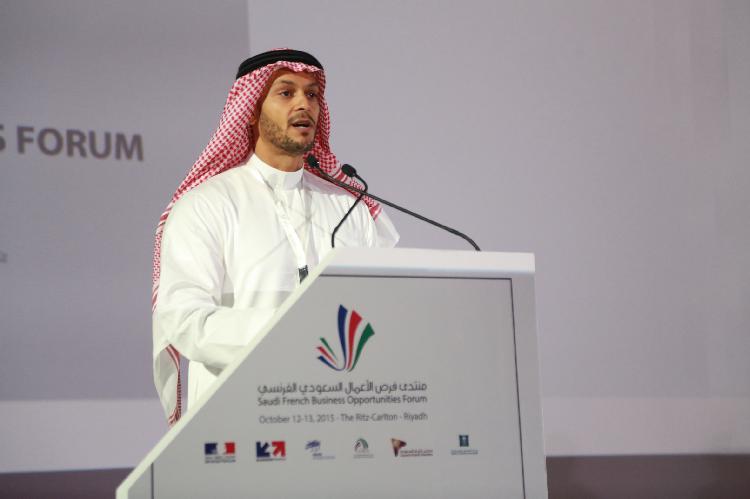
SAGIA “keen to double French investment in Kingdom”
The Saudi Arabian General Authority for Investment today stressed the importance of strategic and historical relations between Saudi Arabia and France, especially on economic and investment levels, and said there is scope for broader development of bilateral ties.
SAGIA’s Executive Director for Investment Development Faisal Bafarat, speaking at a session on [insert here] at the Saudi-French Business Opportunities Forum in Riyadh, revealed there are 194 projects in the Kingdom partly or fully-owned by French companies with a total capital of about SR75 billion. He said SAGIA’s ambition was to double the size of these investments in light of the various incentives offered by the Kingdom and its attractive environment for domestic and foreign investments.
He added the Kingdom recently paved the way for foreign companies to invest in the wholesale and retail trade sectors with 100 percent ownership, exceeding the targets committed by the Kingdom at the World Trade Organization. He also pointed to the guidance of Custodian of the Two Holy Mosques King Salman, the Ministry of Commerce and Industry and SAGIA in examining all trade and investment regimes in order to facilitate the work of international companies and provide incentives for those wishing to invest in the Kingdom, with the aim of attracting international manufacturers directly to sell their products to consumers.
This is in addition to SAGIA’s recent announcement to apply fast-track service mechanisms for the issuance of licenses, which includes reducing the required 12 documents to three only so that licenses are issued within five working days. Investment licenses for outstanding companies can also be extended for up to 15 years to guarantee the presence of licensed investment companies in the Kingdom and to promote opportunities for investors to become an important pillar in achieving the developmental objectives of the state. Regulations were also implemented to grant investor status to entrepreneurs and owners of innovative companies in order to support the Kingdom’s transition to a knowledge-based economy and to diversify the production base by stimulating small and medium-sized investments that contribute to the transfer of knowledge in the Kingdom.
Bafarat pointed out that the Saudi economy is the largest in the region and one of the 20 largest in the world. He said the Kingdom’s GDP doubled from about $328 billion in 2005 to about $752 billion in 2014, a growth rate of 129 percent. This growth was the highest among the 20 largest economies in the world.
The Kingdom also has one of the lowest public debt to gross domestic product ratios. Bafarat said that given the attractiveness of the Saudi economy and the investment opportunities it offers, the Kingdom provides many facilities and incentives for investors and welcomes investments from leading companies that contribute to the promotion of technology transfer and innovation. These incentives are accompanied by efforts actively seeking to remove obstacles facing investors and continuous development of regulations and legislation to facilitate ongoing procedures.
There are also institutional efforts to improve the investment environment and develop opportunities in order to achieve an effective partnership between investors and the Kingdom, said Bafarat. These efforts are supported by “unique” political and economic stability, as well as “rewarding” investment opportunities for investors in a number of promising sectors and regions.
Discussing the consolidated investment plan set by several government agencies in the Kingdom that aims to establish investment entities to achieve sustainable development, Bafarat said this approach and the creation of an integrated plan for each investment sector “will help these sectors to achieve global competitiveness and become a major contributor of the economy, and reflect on the state's efforts in achieving the desired sustainable development.”
The Kingdom spends around SR20 billion in the healthcare sector annually, with about 41 percent of this amount on imports of equipment, cosmetics and medicine. The investment plan for health care, prepared by the Ministry of Health in collaboration with SAGIA, has identified more than 40 promising investment opportunities worth $71 billion, especially in the manufacture of medical equipment, medicines and vaccines, establishment and management of hospitals and primary health care centers, laboratories, research, training institutes, e-health, finance and health insurance.
The investment plan in the transportation sector, prepared by the Ministry of Transport in cooperation with SAGIA, also identified 36 promising investment opportunities potentially worth up to $25 billion. They include bus and rail vehicles manufacturing, spare parts and technical support services in the establishment of infrastructure works, operations, maintenance and training.
The industrial equipment and spare parts market is worth more than $15 billion in Saudi Arabia, and several stakeholders concerned with the importation or use of industrial equipment in the Kingdom identified industrial pumps, valves and pistons as a priority for local manufacture.
SAGIA recently announced that it will receive requests from international companies to invest in the Kingdom and sell their products directly in the Saudi market with 100 percent ownership through its official website www.sagia.gov.sa and via e-mail (trading@sagia.gov.sa).



























